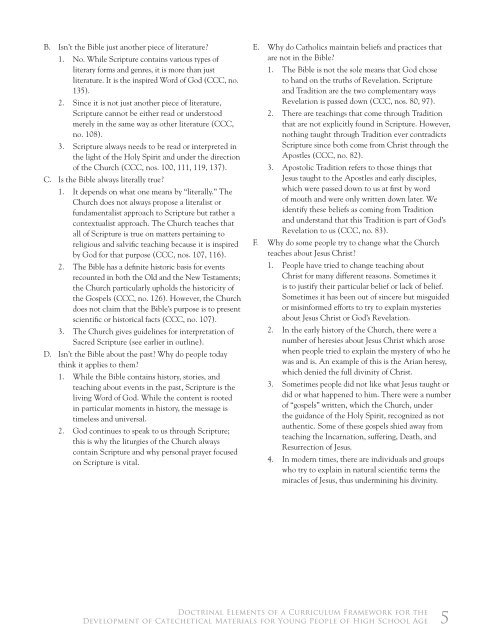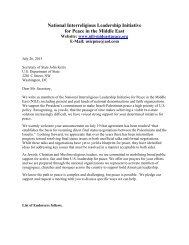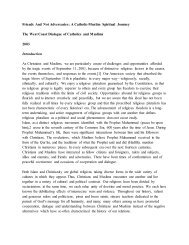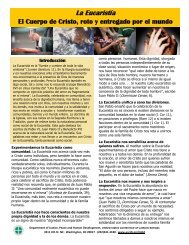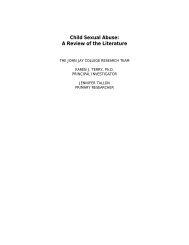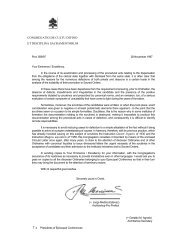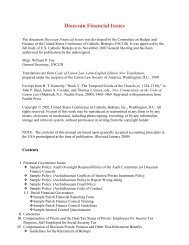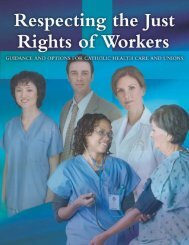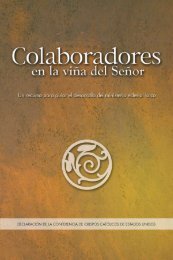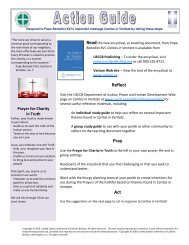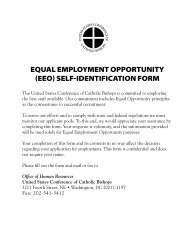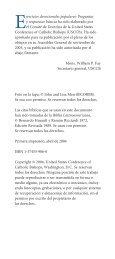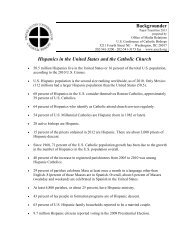Doctrinal Elements of a Curriculum Framework for the Development ...
Doctrinal Elements of a Curriculum Framework for the Development ...
Doctrinal Elements of a Curriculum Framework for the Development ...
- No tags were found...
Create successful ePaper yourself
Turn your PDF publications into a flip-book with our unique Google optimized e-Paper software.
B. Isn’t <strong>the</strong> Bible just ano<strong>the</strong>r piece <strong>of</strong> literature?1. No. While Scripture contains various types <strong>of</strong>literary <strong>for</strong>ms and genres, it is more than justliterature. It is <strong>the</strong> inspired Word <strong>of</strong> God (CCC, no.135).2. Since it is not just ano<strong>the</strong>r piece <strong>of</strong> literature,Scripture cannot be ei<strong>the</strong>r read or understoodmerely in <strong>the</strong> same way as o<strong>the</strong>r literature (CCC,no. 108).3. Scripture always needs to be read or interpreted in<strong>the</strong> light <strong>of</strong> <strong>the</strong> Holy Spirit and under <strong>the</strong> direction<strong>of</strong> <strong>the</strong> Church (CCC, nos. 100, 111, 119, 137).C. Is <strong>the</strong> Bible always literally true?1. It depends on what one means by “literally.” TheChurch does not always propose a literalist orfundamentalist approach to Scripture but ra<strong>the</strong>r acontextualist approach. The Church teaches thatall <strong>of</strong> Scripture is true on matters pertaining toreligious and salvific teaching because it is inspiredby God <strong>for</strong> that purpose (CCC, nos. 107, 116).2. The Bible has a definite historic basis <strong>for</strong> eventsrecounted in both <strong>the</strong> Old and <strong>the</strong> New Testaments;<strong>the</strong> Church particularly upholds <strong>the</strong> historicity <strong>of</strong><strong>the</strong> Gospels (CCC, no. 126). However, <strong>the</strong> Churchdoes not claim that <strong>the</strong> Bible’s purpose is to presentscientific or historical facts (CCC, no. 107).3. The Church gives guidelines <strong>for</strong> interpretation <strong>of</strong>Sacred Scripture (see earlier in outline).D. Isn’t <strong>the</strong> Bible about <strong>the</strong> past? Why do people todaythink it applies to <strong>the</strong>m?1. While <strong>the</strong> Bible contains history, stories, andteaching about events in <strong>the</strong> past, Scripture is <strong>the</strong>living Word <strong>of</strong> God. While <strong>the</strong> content is rootedin particular moments in history, <strong>the</strong> message istimeless and universal.2. God continues to speak to us through Scripture;this is why <strong>the</strong> liturgies <strong>of</strong> <strong>the</strong> Church alwayscontain Scripture and why personal prayer focusedon Scripture is vital.E. Why do Catholics maintain beliefs and practices thatare not in <strong>the</strong> Bible?1. The Bible is not <strong>the</strong> sole means that God choseto hand on <strong>the</strong> truths <strong>of</strong> Revelation. Scriptureand Tradition are <strong>the</strong> two complementary waysRevelation is passed down (CCC, nos. 80, 97).2. There are teachings that come through Traditionthat are not explicitly found in Scripture. However,nothing taught through Tradition ever contradictsScripture since both come from Christ through <strong>the</strong>Apostles (CCC, no. 82).3. Apostolic Tradition refers to those things thatJesus taught to <strong>the</strong> Apostles and early disciples,which were passed down to us at first by word<strong>of</strong> mouth and were only written down later. Weidentify <strong>the</strong>se beliefs as coming from Traditionand understand that this Tradition is part <strong>of</strong> God’sRevelation to us (CCC, no. 83).F. Why do some people try to change what <strong>the</strong> Churchteaches about Jesus Christ?1. People have tried to change teaching aboutChrist <strong>for</strong> many different reasons. Sometimes itis to justify <strong>the</strong>ir particular belief or lack <strong>of</strong> belief.Sometimes it has been out <strong>of</strong> sincere but misguidedor misin<strong>for</strong>med ef<strong>for</strong>ts to try to explain mysteriesabout Jesus Christ or God’s Revelation.2. In <strong>the</strong> early history <strong>of</strong> <strong>the</strong> Church, <strong>the</strong>re were anumber <strong>of</strong> heresies about Jesus Christ which arosewhen people tried to explain <strong>the</strong> mystery <strong>of</strong> who hewas and is. An example <strong>of</strong> this is <strong>the</strong> Arian heresy,which denied <strong>the</strong> full divinity <strong>of</strong> Christ.3. Sometimes people did not like what Jesus taught ordid or what happened to him. There were a number<strong>of</strong> “gospels” written, which <strong>the</strong> Church, under<strong>the</strong> guidance <strong>of</strong> <strong>the</strong> Holy Spirit, recognized as notau<strong>the</strong>ntic. Some <strong>of</strong> <strong>the</strong>se gospels shied away fromteaching <strong>the</strong> Incarnation, suffering, Death, andResurrection <strong>of</strong> Jesus.4. In modern times, <strong>the</strong>re are individuals and groupswho try to explain in natural scientific terms <strong>the</strong>miracles <strong>of</strong> Jesus, thus undermining his divinity.<strong>Doctrinal</strong> <strong>Elements</strong> <strong>of</strong> a <strong>Curriculum</strong> <strong>Framework</strong> <strong>for</strong> <strong>the</strong><strong>Development</strong> <strong>of</strong> Catechetical Materials <strong>for</strong> Young People <strong>of</strong> High School Age5


